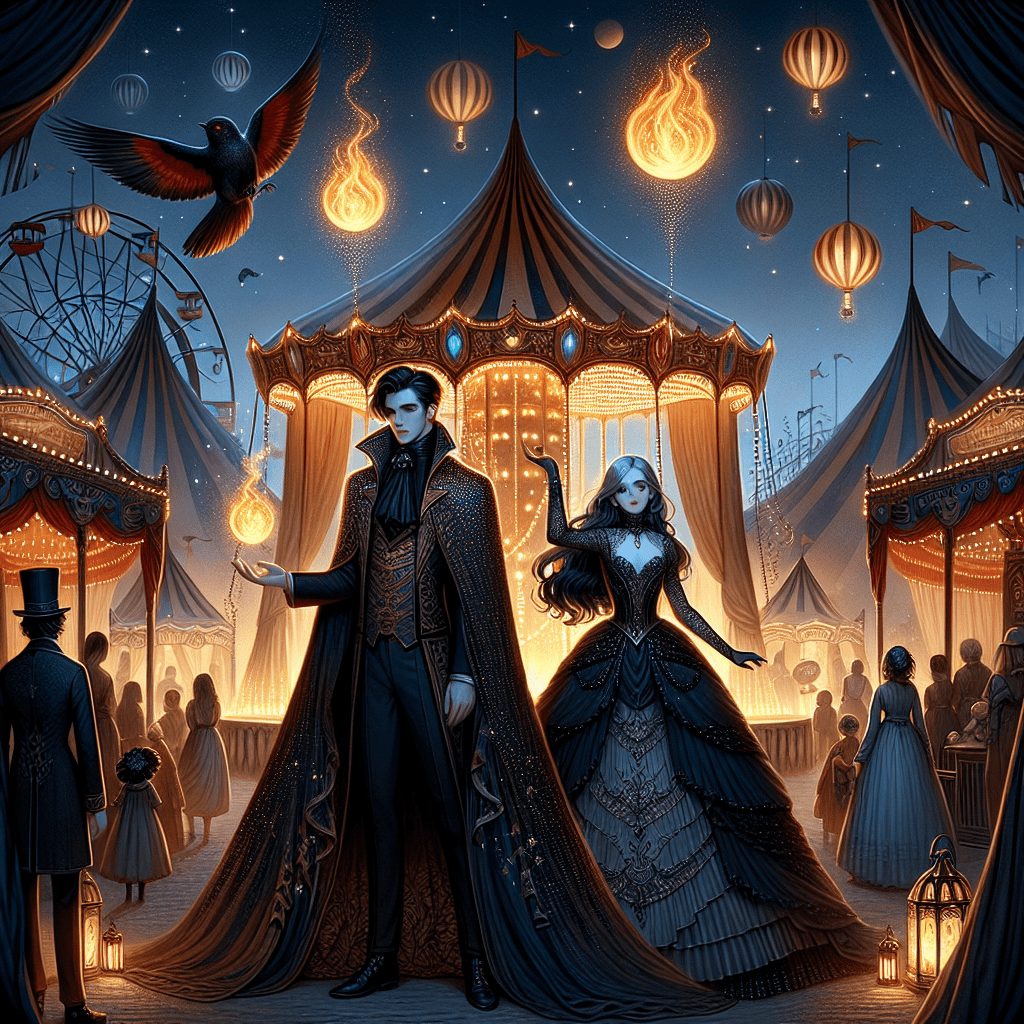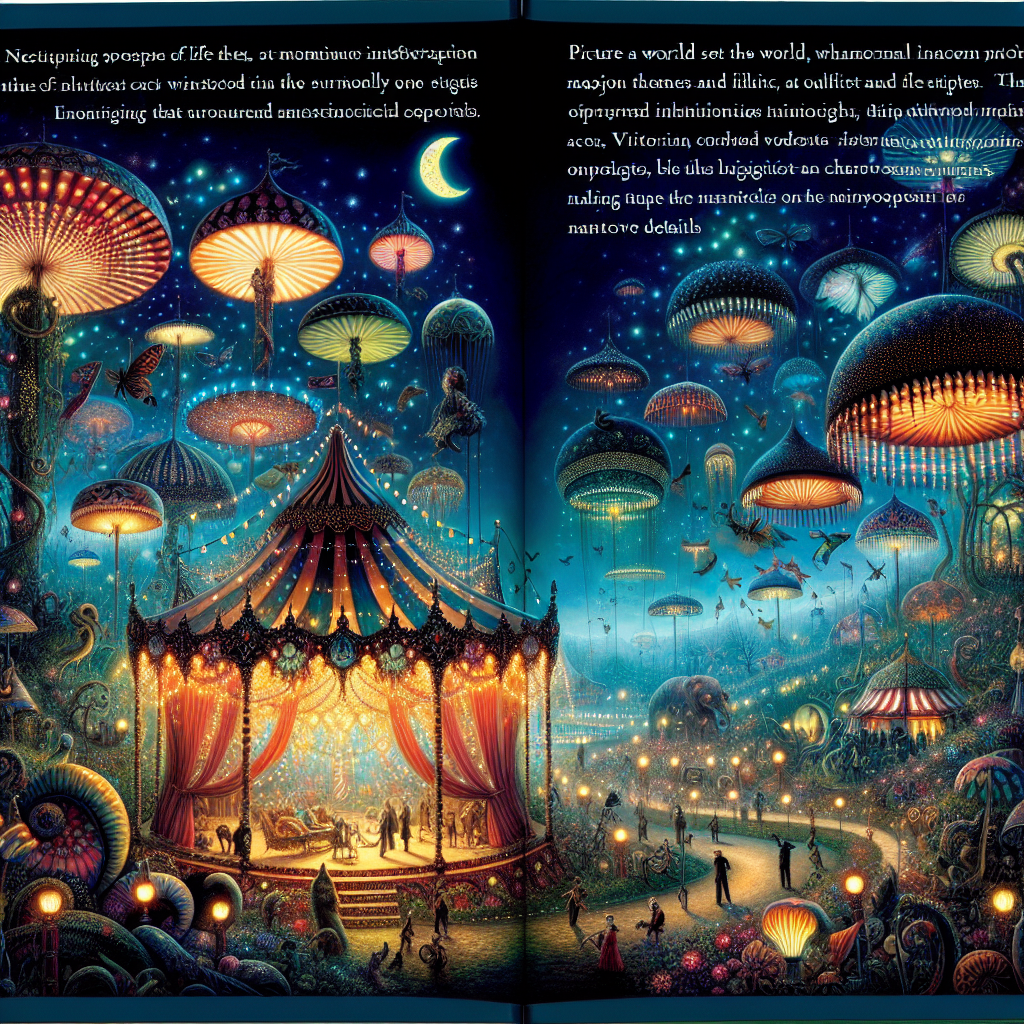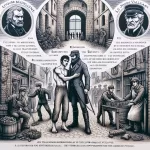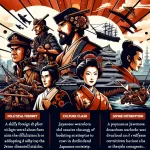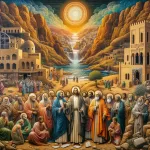-
Table of Contents
“Step into a world of magic and rivalry: The Night Circus weaves a tale of love, destiny, and the enchanting power of dreams.”
“The Night Circus,” written by Erin Morgenstern, is a captivating fantasy novel that weaves a tale of magic, competition, and romance set against the backdrop of a mysterious circus that appears only at night. The story revolves around two young illusionists, Celia Bowen and Marco Alisdair, who are bound by a fierce competition orchestrated by their mentors. As they create enchanting displays within the circus, they unknowingly entangle the lives of the circus performers and patrons in their rivalry. The novel explores themes of love, sacrifice, and the nature of competition, while its richly drawn characters navigate the complexities of their relationships and the consequences of their magical abilities. Through its lyrical prose and imaginative world-building, “The Night Circus” invites readers into a realm where dreams and reality intertwine, leaving a lasting impression of wonder and intrigue.
The Enigmatic Setting of The Night Circus
The Night Circus, a novel by Erin Morgenstern, is set against a backdrop that is as enchanting as it is mysterious. The story unfolds primarily within the confines of a magical circus known as Le Cirque des Rêves, which translates to “The Circus of Dreams.” This circus is unlike any other; it opens only at night and features a series of fantastical tents, each offering a unique experience that captivates the imagination of its visitors. The setting itself becomes a character in the narrative, contributing to the overall atmosphere of wonder and intrigue that permeates the book.
As the narrative progresses, the reader is introduced to the various tents that make up the circus. Each tent is meticulously crafted, showcasing a different theme and experience. For instance, one tent is filled with a garden of ice, where delicate sculptures and frozen flora create a breathtaking spectacle. Another tent features a labyrinth of clouds, inviting visitors to lose themselves in a dreamlike environment. These vivid descriptions not only serve to immerse the reader in the world of the circus but also reflect the broader themes of illusion and reality that are central to the story.
Moreover, the circus itself operates under a set of rules that are as enigmatic as its setting. The competition between the two main characters, Celia Bowen and Marco Alisdair, unfolds within this magical realm, where their abilities to manipulate reality are tested. The circus becomes a battleground for their talents, and the stakes are high, as the outcome of their rivalry will determine not only their fates but also the fate of the circus itself. This tension adds a layer of complexity to the setting, as it transforms from a place of wonder into one of danger and uncertainty.
In addition to the physical setting of the circus, the temporal aspect also plays a crucial role in shaping the narrative. The story is not linear; it weaves through different time periods, creating a sense of timelessness that enhances the magical quality of the circus. This non-linear storytelling allows readers to experience the evolution of the circus and its characters in a way that feels both immediate and distant, further blurring the lines between reality and fantasy.
The enigmatic nature of the setting is complemented by the diverse cast of characters who inhabit the circus. Each character brings their own unique perspective and backstory, enriching the narrative and adding depth to the overall experience. From the enigmatic proprietors of the circus to the various performers who showcase their talents, each individual contributes to the tapestry of the circus, making it a vibrant and dynamic environment. The interactions between these characters often reflect the themes of love, sacrifice, and the consequences of ambition, which are intricately woven into the fabric of the story.
In conclusion, the setting of The Night Circus is a crucial element that enhances the narrative and themes of the novel. The magical and mysterious atmosphere of Le Cirque des Rêves serves as a backdrop for the unfolding drama between Celia and Marco, while also inviting readers to explore the complexities of illusion and reality. Through its vivid descriptions and intricate details, the setting not only captivates the imagination but also deepens the emotional resonance of the characters’ journeys. Ultimately, the enigmatic nature of the circus leaves a lasting impression, inviting readers to ponder the nature of dreams and the power of the imagination.
Key Themes of Magic and Competition
In Erin Morgenstern’s “The Night Circus,” the themes of magic and competition are intricately woven into the narrative, creating a rich tapestry that captivates readers. At its core, the novel presents a unique interpretation of magic, not merely as a series of tricks or illusions, but as a profound and transformative force that shapes the lives of its characters. The circus itself, Le Cirque des Rêves, serves as a manifestation of this magic, appearing unexpectedly and enchanting all who enter. This magical realm is not just a backdrop; it is a living entity that reflects the emotions and struggles of the characters, particularly the two protagonists, Celia Bowen and Marco Alisdair.
The competition between Celia and Marco is central to the plot, driving the narrative forward and creating tension that permeates every aspect of the story. Bound by a mysterious challenge set forth by their mentors, the two young magicians must engage in a battle of skills, each striving to outdo the other. However, this competition is not merely about winning; it is also about the exploration of their identities and the limits of their abilities. As they create wondrous displays within the circus, their magic becomes a means of self-discovery, revealing their innermost desires and fears. The stakes of this competition are high, as the outcome not only determines their fates but also impacts the lives of those around them, including the circus performers and patrons who become unwitting participants in their rivalry.
Moreover, the theme of competition extends beyond the personal struggle between Celia and Marco. It encompasses the broader implications of ambition and the sacrifices that come with pursuing greatness. The novel delves into the idea that competition can be both a catalyst for creativity and a source of destruction. As Celia and Marco push the boundaries of their magical abilities, they inadvertently endanger the very world they seek to enchant. This duality highlights the complexity of ambition, suggesting that the pursuit of excellence can lead to unforeseen consequences, both for the individual and the community.
In addition to magic and competition, the novel explores the theme of love, which emerges as a powerful counterbalance to the rivalry. Celia and Marco’s relationship evolves amidst the backdrop of their competition, illustrating how love can transcend the boundaries set by external forces. Their connection deepens as they navigate the challenges imposed by their mentors and the circus itself, ultimately revealing that love can be a source of strength rather than a weakness. This theme resonates throughout the narrative, emphasizing that while competition may drive individuals apart, love has the potential to unite them, even in the face of insurmountable odds.
Furthermore, the novel raises questions about the nature of choice and free will. As Celia and Marco grapple with their destinies, they are often confronted with the limitations imposed by their mentors and the rules of the competition. This struggle invites readers to consider the extent to which individuals can shape their own paths versus being bound by external expectations. The interplay between magic and competition serves as a lens through which these themes are examined, ultimately suggesting that while magic can create extraordinary possibilities, it is the choices made by the characters that define their journeys.
In conclusion, “The Night Circus” masterfully intertwines the themes of magic and competition, creating a narrative that is both enchanting and thought-provoking. Through the experiences of Celia and Marco, readers are invited to reflect on the complexities of ambition, love, and the choices that shape our lives, all set against the mesmerizing backdrop of a magical circus that defies the ordinary.
Character Analysis: Celia Bowen
Celia Bowen, one of the central characters in Erin Morgenstern’s “The Night Circus,” embodies the complexities of talent, ambition, and emotional depth. From a young age, Celia is introduced to the world of magic through her father, a renowned magician who imposes rigorous training on her. This early exposure to the art of illusion shapes her identity and sets the stage for her extraordinary abilities. Unlike many characters who might revel in their gifts, Celia grapples with the weight of her father’s expectations and the inherent responsibilities that come with her powers. This internal conflict is a recurring theme throughout the narrative, as Celia navigates the fine line between control and chaos.
As the story unfolds, Celia’s character evolves significantly. Initially portrayed as a somewhat passive figure, she gradually transforms into a formidable force within the confines of the circus. Her journey is marked by a struggle for autonomy, as she seeks to define her own path rather than merely fulfilling her father’s ambitions. This quest for self-identity is further complicated by her relationship with Marco, her rival and love interest. Their connection is not merely romantic; it is deeply intertwined with the competition that drives the narrative forward. The tension between love and rivalry adds layers to Celia’s character, illustrating her capacity for both vulnerability and strength.
Moreover, Celia’s relationship with the circus itself serves as a crucial aspect of her character development. The circus, with its enchanting allure and mysterious ambiance, becomes a canvas for her creativity and a manifestation of her emotional state. As she learns to harness her powers, the circus transforms into a reflection of her inner turmoil and desires. This symbiotic relationship highlights the theme of creation and destruction, as Celia’s magic can both enchant and endanger those around her. The duality of her abilities underscores the complexity of her character, revealing the potential for both beauty and chaos in her actions.
Celia’s interactions with other characters further enrich her narrative arc. Her bond with her father is fraught with tension, as she seeks to break free from his controlling influence while simultaneously yearning for his approval. This dynamic illustrates the broader theme of parental expectations and the struggle for independence, a theme that resonates with many readers. Additionally, her friendships with other circus performers, such as the enigmatic Isobel and the whimsical Poppet and Widget, provide moments of levity and support, contrasting with her often solitary journey. These relationships highlight Celia’s capacity for empathy and connection, showcasing her as a multidimensional character who is not solely defined by her magical prowess.
Ultimately, Celia Bowen emerges as a symbol of resilience and self-discovery. Her journey through the intricacies of love, rivalry, and personal growth encapsulates the essence of “The Night Circus.” As she learns to embrace her powers and forge her own destiny, Celia becomes a beacon of hope and inspiration. Her character serves as a reminder that true strength lies not only in one’s abilities but also in the courage to confront one’s fears and desires. Through Celia, Morgenstern crafts a narrative that explores the delicate balance between ambition and authenticity, inviting readers to reflect on their own journeys of self-discovery and the magic that lies within.
Character Analysis: Marco Alisdair
In Erin Morgenstern’s enchanting novel, “The Night Circus,” Marco Alisdair emerges as a pivotal character whose journey is intricately woven into the fabric of the narrative. Marco, an orphaned boy with a remarkable affinity for magic, is introduced as a young child who is taken under the wing of the enigmatic Mr. A.H. (Alexander) and trained in the art of illusion and manipulation. This early mentorship shapes Marco’s identity and sets the stage for his complex relationship with the circus and its other inhabitants. As the story unfolds, Marco’s character evolves from a mere apprentice to a formidable magician, showcasing his growth and the burdens that accompany his talents.
One of the most compelling aspects of Marco’s character is his deep-seated desire for connection and belonging. Throughout the novel, he grapples with the isolation that comes from being a pawn in a larger game orchestrated by his mentor and the mysterious Celia Bowen. This longing for companionship is poignantly illustrated in his interactions with the circus, where he finds solace among the performers and the magical atmosphere of the tents. The circus itself becomes a sanctuary for Marco, allowing him to explore his identity beyond the confines of his training. His relationship with Celia, in particular, serves as a catalyst for his emotional development, as their bond transcends the competitive nature of their magical duel.
Moreover, Marco’s character is marked by a profound sense of morality and empathy. Unlike many of the other characters who are driven by ambition or a desire for power, Marco’s motivations are rooted in a genuine concern for the well-being of those around him. This is evident in his interactions with the circus performers, whom he treats with respect and kindness. His willingness to challenge the rules of the competition in order to protect Celia and the circus reflects his internal struggle between duty and love. This moral complexity adds depth to Marco’s character, making him relatable and human in a world filled with fantastical elements.
As the narrative progresses, Marco’s character is further defined by his resilience and adaptability. Faced with the challenges posed by the competition, he learns to navigate the intricacies of the magical world while remaining true to himself. His ability to harness his powers creatively allows him to contribute to the circus in unique ways, showcasing his ingenuity and resourcefulness. This adaptability is not merely a survival mechanism; it also signifies Marco’s growth as he learns to embrace his identity as a magician and an individual.
In conclusion, Marco Alisdair stands out as a richly developed character in “The Night Circus.” His journey from a lonely apprentice to a compassionate and skilled magician encapsulates the themes of love, sacrifice, and the quest for identity that permeate the novel. Through his relationships, particularly with Celia, and his moral compass, Marco embodies the struggle between personal ambition and the desire for connection. Ultimately, his character serves as a reminder of the power of love and the importance of forging one’s path in a world filled with uncertainty and magic. As readers delve into Marco’s story, they are invited to reflect on their own journeys of self-discovery and the connections that shape their lives.
The Role of Fate and Free Will in the Narrative
In “The Night Circus,” the intricate interplay between fate and free will serves as a central theme that shapes the narrative and the characters’ journeys. The story unfolds within the enchanting confines of Le Cirque des Rêves, a magical circus that appears without warning and captivates its audience with its ethereal beauty and mysterious allure. At the heart of this mesmerizing spectacle lies a fierce competition between two young illusionists, Celia Bowen and Marco Alisdair, who are bound by a challenge imposed upon them by their mentors. This competition, however, is not merely a test of skill; it is a manifestation of the larger philosophical questions surrounding destiny and autonomy.
As the narrative progresses, it becomes evident that both Celia and Marco are pawns in a game orchestrated by their respective mentors, who have their own visions of success and control. The constraints placed upon them highlight the theme of fate, as the characters grapple with the expectations and limitations imposed by their mentors. Despite the seemingly predetermined nature of their paths, Celia and Marco exhibit moments of agency that challenge the notion of fate. Their choices, driven by love and a desire for freedom, illustrate the tension between the forces that seek to dictate their lives and their innate desire to forge their own destinies.
Moreover, the circus itself serves as a metaphor for the delicate balance between fate and free will. Each tent within the circus represents a different aspect of the characters’ lives and choices, showcasing the myriad possibilities that exist within the confines of their predetermined roles. As Celia and Marco navigate the complexities of their competition, they encounter various characters who embody different responses to fate. Some characters, like the enigmatic figure of the man in the grey suit, seem to accept their roles with resignation, while others, such as the circus performers, actively embrace their individuality and creativity, suggesting that even within the constraints of fate, there exists room for personal expression.
The relationship between Celia and Marco further complicates the theme of fate versus free will. Their bond transcends the boundaries set by their mentors, illustrating how love can serve as a powerful force that challenges the constraints of destiny. As they grow closer, they begin to influence each other’s abilities and choices, ultimately demonstrating that while fate may set the stage, it is the characters’ decisions that shape the outcome of their lives. This dynamic culminates in a poignant exploration of sacrifice, as both characters must confront the implications of their choices and the impact on those they love.
In conclusion, “The Night Circus” intricately weaves the themes of fate and free will throughout its narrative, inviting readers to ponder the extent to which individuals can shape their own destinies. Through the experiences of Celia and Marco, the novel illustrates that while external forces may impose limitations, the power of choice and the strength of human connection can transcend those boundaries. Ultimately, the story suggests that life is a delicate dance between the predetermined and the self-determined, where the magic of free will can illuminate even the darkest corners of fate. As readers journey through the enchanting world of the circus, they are left to reflect on their own lives and the choices that define them, making “The Night Circus” not only a tale of magic but also a profound exploration of the human experience.
The Symbolism of the Night Circus Itself
In Erin Morgenstern’s novel “The Night Circus,” the circus itself serves as a rich symbol that encapsulates the themes of magic, competition, and the duality of human experience. Known as Le Cirque des Rêves, the circus appears without warning and operates only at night, creating an enchanting atmosphere that draws in visitors from far and wide. This ephemeral quality of the circus symbolizes the transient nature of dreams and the fleeting moments of wonder that life can offer. The black-and-white striped tents, which are both striking and mysterious, evoke a sense of duality, reflecting the contrasting elements of light and dark, joy and sorrow, that permeate the narrative.
As the story unfolds, the circus becomes a battleground for the two young magicians, Celia Bowen and Marco Alisdair, who are bound by a competition orchestrated by their mentors. This competition, set against the backdrop of the circus, symbolizes the struggle for identity and mastery over one’s own fate. The magical feats performed within the circus tents are not merely spectacles; they represent the characters’ internal conflicts and their quest for self-discovery. Each act, from the breathtaking illusions to the mesmerizing displays of skill, serves as a metaphor for the characters’ emotional journeys, illustrating how their personal struggles manifest in the enchanting world they create.
Moreover, the circus itself is a microcosm of the larger world, populated by a diverse cast of characters who each contribute to the overarching narrative. The performers, with their unique talents and backstories, symbolize the myriad ways in which individuals cope with their own challenges and desires. For instance, the contortionist, the fortune teller, and the illusionist each embody different aspects of human experience, from the pursuit of love to the quest for acceptance. Through these characters, Morgenstern explores themes of belonging and the search for purpose, highlighting how the circus serves as a refuge for those who feel out of place in the ordinary world.
The symbolism of the night also plays a crucial role in the narrative. The darkness of night allows for the emergence of magic, suggesting that the unknown can be a source of wonder and possibility. This theme is further emphasized by the way the circus operates exclusively after sunset, inviting visitors to leave behind their mundane lives and immerse themselves in a realm where the extraordinary becomes possible. The night, therefore, symbolizes both the allure of the unknown and the inherent risks that come with it, mirroring the characters’ own journeys as they navigate the complexities of love, ambition, and sacrifice.
In addition to representing dreams and competition, the circus also serves as a reminder of the consequences of ambition. The enchanting world of Le Cirque des Rêves is not without its darker undertones, as the competition between Celia and Marco ultimately leads to unforeseen repercussions for both themselves and those they love. This duality underscores the idea that while the pursuit of one’s dreams can lead to extraordinary experiences, it can also result in profound loss and heartache.
In conclusion, the symbolism of the night circus in Morgenstern’s novel is multifaceted, representing the interplay of dreams and reality, the complexities of human relationships, and the dual nature of ambition. Through the enchanting yet perilous world of Le Cirque des Rêves, readers are invited to reflect on their own desires and the choices they make in the pursuit of their dreams, ultimately revealing the intricate tapestry of life itself.
Q&A
1. **What is the main premise of “The Night Circus”?**
– “The Night Circus” revolves around a magical competition between two young illusionists, Celia Bowen and Marco Alisdair, who are bound to each other in a mysterious challenge set by their mentors, with the circus serving as the venue for their contest.
2. **What are the key themes in “The Night Circus”?**
– Key themes include the nature of competition, the complexity of love, the impact of choice and sacrifice, the interplay between reality and illusion, and the exploration of fate versus free will.
3. **Who are the main characters in “The Night Circus”?**
– The main characters include Celia Bowen, a gifted magician; Marco Alisdair, her rival and love interest; and their mentors, Prospero the Enchanter and Mr. A.H., who set the rules of the competition.
4. **How does the setting of the circus contribute to the story?**
– The circus, known as Le Cirque des Rêves, serves as a magical and enchanting backdrop that enhances the atmosphere of mystery and wonder, while also acting as a living entity that reflects the characters’ emotions and the stakes of their competition.
5. **What role do secondary characters play in the narrative?**
– Secondary characters, such as the circus performers and patrons, enrich the story by providing diverse perspectives, adding depth to the circus’s magical world, and illustrating the impact of Celia and Marco’s competition on others.
6. **What is the significance of the ending of “The Night Circus”?**
– The ending highlights the consequences of the competition, the sacrifices made by the characters, and ultimately emphasizes the enduring power of love and the choices that define their fates.”The Night Circus” by Erin Morgenstern is a captivating tale of a magical competition between two young illusionists, Celia and Marco, set against the backdrop of a mysterious circus that appears only at night. The novel explores themes of love, sacrifice, and the nature of competition, as the protagonists navigate their complex relationship while bound by the constraints of their rivalry. The richly woven narrative features a diverse cast of characters, each contributing to the enchanting atmosphere of the circus and the overarching conflict. Ultimately, the story highlights the interplay between fate and free will, illustrating how personal choices can shape destinies within a world of wonder and enchantment.
